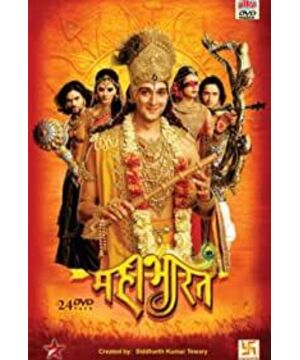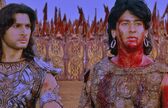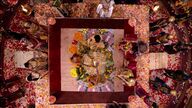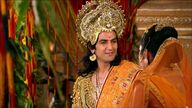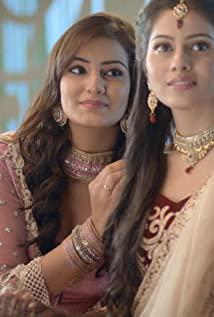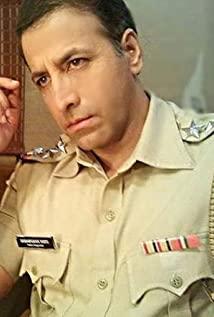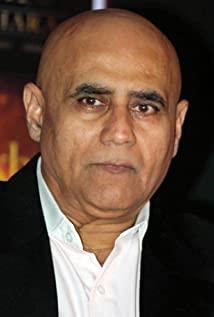I explained in advance that I did not read the original book of "Mahabharata", I only read the fragments and Karna's English script written by Tagore.
The most embarrassing part of the play is that the screenwriter attempts to integrate modern consciousness into the plot of the original book, adapting some plots that were considered correct at that time in the original book but seem ignorant and backward today, and add some private goods of human rights awareness and feminist awareness. However, it is estimated that the status of Indian religion is still very authoritative. The screenwriter wants to respect the original work, and does not dare to make major changes. He can only make changes with a small hand, and the result is such an embarrassing situation. Therefore, many of the original logic and strange plots of the show have not been rounded up, and some character settings appear to be a bit refined after the fate and stains have been deleted.
In the past, I only watched "Three Silly", "PEE.K" and "Oh My God" in Indian movies. In these movies, I think the thinking of the Indian people is still very flexible and advanced, full of reflective spirit. But the changes of this TV series are hard to satisfy, and even the truth it expresses is like the speech of Sunflower (? I forgot his name) in the cutscene, "What you said makes sense but what's the use?" , appears empty and does not touch on the core issues, caste system, discrimination and prejudice.
The caste system is a product of the Indian social environment that I have a hard time understanding. In the past, the four classes were briefly introduced in the history books. Only when I actually watched the drama did I realize how cruel and unreasonable it was.
If you are competing with others to pick apples, and you are no match for the others, you have two ways to win. One is to grow two more arms by yourself, and the other is to cut off two of your opponent's arms.
The caste system adopts the latter. Restricting talented people from entering higher social classes by suppressing, thereby protecting their children's position in a particular higher class, is simple and crude but useful.
Therefore, Karna's behavior of going all the way to the dark is not difficult to understand.
My initial impression of Karna came from Fate Apocrypha, in which Karna is obviously a lucky E and self-reported as a lucky A. It is so cute that she feels that she has no regrets in her life; this kind of compassionate attitude and never resentment is really full of divinity, no wonder Divinity A. However, Karna's attitude and emotional struggle in this play is more in line with human identity. His cynical resentment and kindness in his heart are intertwined, and everything he seeks and does is for respect, which makes him both inferior and self-respecting, noble and humble, what a hero in the style of ancient Greek tragedy.
The director's personal stuff added to Karna's lines is still great, and freedom, equality and fraternity shine brightly.
But it is quite ironic that Karna's true identity is the illegitimate son of the sun god and the queen. He is just a product of an accidental exile to the lower class (some people seem to have popularized that his caste is considered high in the lower caste) instead of True lower caste origin. The value orientation of the play is obvious. A group of princes of high caste and high social class, the sons of gods and the reincarnation of gods, the story of the last bloodshed in the fight for the throne. After all, there is no way to break free from the barriers of the caste system. Epics tell the stories of noble-born or idle gods, not people.
The screenwriter is undoubtedly aware of the hidden logic and dross of this epic, so he added a lot of preaching lines to Sunflower to discuss this issue, but I think Sunflower's words are completely contradictory, "You should accept your Born to pursue righteousness" "You should strive for the interests of the entire class, not just for yourself". Each sentence makes sense separately, but when put together, there is no practical significance and no logical coherence. And the most brazen thing about this person is that he doesn't answer the questions he can't answer, and goes around and continues to talk about what he wants to talk about.
Don't imitate him when you are in a debate.
The last thing I want to say is that although I don’t know much about India, if India really wants to become prosperous and international, the caste system and religious issues are two mountains that have to be crossed.
PS. Some people say that watching the film should be viewed from Chinese values, but I don't think so. Why do I have to substitute the values of the ancient Indians hundreds of years ago when I watch a TV series for entertainment?
"Nobles are nothing more than institutionalized thieves." Royenthal said, although Luo Shuai was a middle-school senior, what he said was very reasonable.
The caste system is definitely one of the most SB social systems in history; this system seriously hinders the development of society and the progress of ideas while safeguarding the interests of the vested interests. The Mahabharata whose core is to maintain the Dharma of the system is just a predestination. I appreciate some of the exotic plots in the film, but the essence is that I will never agree with it, and I will not substitute it into watching the drama.
And the play is not about the Cultural Difference between China and India at all, but the conflict between ancient thought and modern consciousness. Rancho in "Three Silly" is not a high caste, right? "Pee.K" and "Oh My God" also exposed the ignorance of religion. I don't find it difficult to accept these films.
View more about Mahabharat reviews


